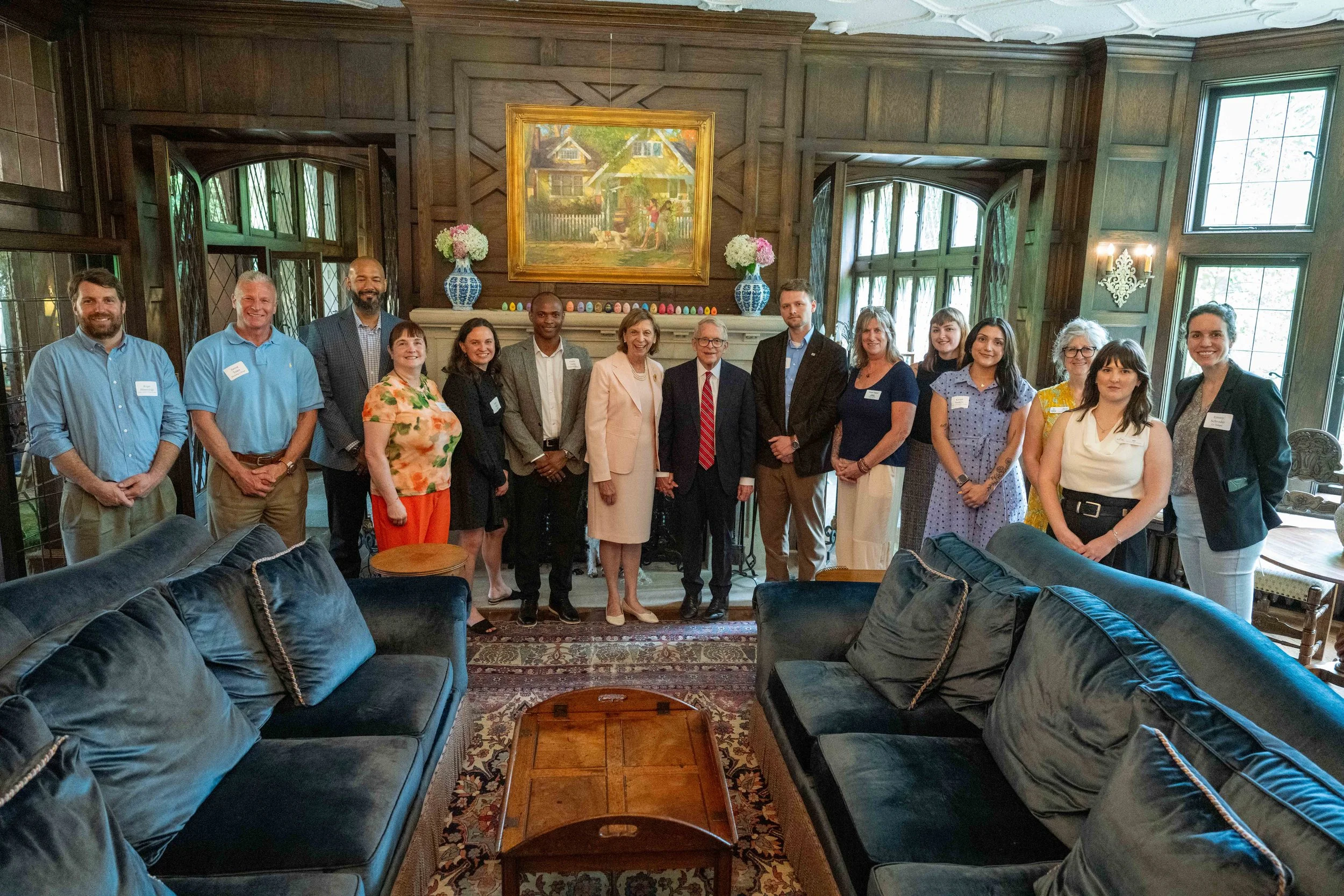Feeding Innovation: How Local Kitchens Are Transforming Food Rescue in Their Communities
By Katie Funk, Inspire and Innovation Program Director
Members of the second Capacity Building Program celebrated their graduation at the Governor’s Residence in July 2025. Graduating members included the 740 Kitchen, Three O’Clock Project, and Hunger Network of Greater Cleveland.
Across the U.S., communities are searching for sustainable ways to fight food insecurity—and many are finding answers in La Soupe’s chef-driven Rescue Transform Share™ model. This approach turns rescued ingredients into nutritious meals while restoring dignity to the emergency food system.
As interest in our model grew, La Soupe looked for a way to share what we’ve learned without drawing resources away from Cincinnati. The solution: a network model where partner organizations can learn directly from La Soupe, Second Helpings, and one another—expanding impact and building stronger local food systems across the region.
Ohio’s First Lady Fran and Governor Mike Dewine enjoy a meal at La Soupe after a tour of the facility,
A Challenge that Sparked a Movement
In 2021, Ohio’s First Lady Fran and Governor Mike DeWine visited La Soupe and saw firsthand how we upcycle surplus food to nourish people and reduce waste. Inspired, they challenged us to bring the model to every city in Ohio, and provided funding to help get it started.
With support from the Ohio Department of Job and Family Services, we partnered with Second Helpings in Indianapolis, whose mentorship helped shape many of La Soupe’s processes, and welcomed Miami Valley Meals in Dayton as our first Ohio partner. Together, we launched the inaugural cohort of the Capacity Building Program, and the Rescue Kitchen Network™ was born.
Two Paths. One Mission.
The Capacity Building Program is a nine-month training initiative designed for existing nonprofit organizations ready to launch or expand a rescue kitchen. Participants meet weekly to cover every aspect of the Rescue Transform Share™ model, from building rescue relationships and community partnerships to food safety, communications, and operations. One additional Ohio-based organization who apply to join the program by December 1, 2025 will be eligible for up to $500K in funding for their operation.
Graduates join the Rescue Kitchen Network™, a second tier that fosters collaboration among organizations operating rescue kitchens. Together, members share resources, coordinate large-scale food rescue, and advocate for food access across state lines.
Miami Valley Meals and La Soupe Staff process carrots at Miami Valley Meals kitchen in Dayton during an on site visit last year. Miami Valley Meals is a member of the Rescue Kitchen Network™ and recently distributed their millionth meal to the Dayton community.
Why Build a Network?
La Soupe believes that local organizations best understand the needs of their own communities. By empowering them with knowledge and infrastructure—not diverting Cincinnati’s local resources. We’re helping to build a nationwide movement rooted in collaboration and sustainability.
Who We Work With
Our past participants range from food rescue groups to culinary schools to local food procurement organizations, all united by a shared mission to reduce food waste and fight hunger through the power of chefs.
Current Rescue Kitchen Network™ Partners Include:
La Soupe (Cincinnati, OH)
Second Helpings (Indianapolis, IN)
Miami Valley Meals (Dayton, OH)
Columbus Food Rescue (Columbus, OH- a program of Local Matters)
Timothy’s Perrysburg Foundation (Perrysburg, OH)
740 Kitchen at Hocking College (Hocking, Ohio)
Hunger Network of Greater Cleveland (Cleveland, OH)
Three O’Clock Project (Baton Rouge, Louisiana)
Join the Movement
Recruitment is now open for our third Capacity Building Program cohort, launching January 2026. We’re looking for new partners including one to serve Adams County, Ohio and welcome applications from organizations across the country.
Program Requirements
Must be a U.S.-based 501(c)(3) nonprofit organization in good standing
Commit to operating a Rescue Kitchen at scale
Employ a full-time chef to manage operations
Prioritize food safety and work with local health authorities (eg. licensure by Health Department or Department of Agriculture)
Investment of $5,000 toward the program to demonstrate sustainability
Together we can build a more resilient, dignified food system for all.




